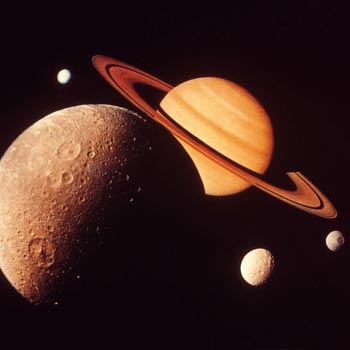Ten Vital Bodies in Astrology

From the first time that humans looked toward the sky and began to chart the movement of the sun, moon and the planets, men have been assigning meaning to what they saw. It wasn’t enough to simply record where the sun moved, when an eclipse happened or when a planet was brightest, complex and varying stories and myths were given to each celestial event to help explain things that were happening in the observer’s own life.
If crops failed, it was blamed on the stars. If war broke out, it was blamed on the stars. Let’s take a look at ten of the heavenly bodies that astrologers assigned meaning to and what each body meant.
The Sun — Not only was the sun the easiest body to see in the sky, it provided light, warmth and life. Most cultures saw the sun as a life giver, not vengeful or angry, but almost judgementless. A benign and powerful giver of life and wellness.
The Moon — The moon, to many early astrologists, represented the unconscious mind and stood for emotion and desire. It often had a negative connotation, simply because it was thought the moon help power over the weak to indulge in their inner most desires. The old superstition of a full moon altering people’s behavior or even turning some into werewolves stems from the idea of the moon holding a mysterious power over one’s emotional side. The Moon is also associated with Monday, short for MoonDay.
Mercury — This planet is named after the Roman messenger god of the same name and thus the planet Mercury is thought to be the body that rules things like communication, rationality and logic, as well as transport. It is thought to bring out people’s curious nature, as well as being vivacious and inconsistent. Mercury is thought to rule over Wednesday. In astrology practiced in China, Mercury is ruled over by the element of water. In India, Mercury stands for intelligence.
Venus — Venus is one of the brightest objects in the sky after the sun and the moon. It is named after the Roman god of love and the planet is thought to control love in astrology. The planet is also thought to affect things like beauty, harmony and it plays an important role in people wanting or not wanting to get along. Throughout time and culture, Venus has represented peace, love and human potential. Venus is the planet for Friday and in Chinese astrology it is associated with metal.
Mars — Maybe no other planet is better known than Mars. The planet’s place as bringer or war, aggression and terror is well known in most every culture. It is also associated with confidence and impulsiveness. Mars is usually associated with Tuesday and it is a fire element in Chinese astrology. Mars role as a bringer of war is apparent throughout human literature highlighted by H.G. Wells The War of the Worlds where invaders from Mars come to Earth to wipe out human civilization.
Jupiter — The biggest planet in the solar system is associated with happiness and joy. Jupiter rules over Thursday and is also associated with higher education, religion and growth. Many also believe Jupiter plays a role in protection, since it does protect the Earth from many wayward comets and asteroids by using it’s gravitational pull to absorb many hits that would otherwise strike the Earth.
Saturn — The final planet in the original seven planets that ruled astrology for years, Saturn is seen as cold and lifeless and is associated with ideas such as structure and sadness. In India, the planet is thought to bring bad luck. Saturn is tied in with the day Saturday and it is an Earth element in China.
Uranus– While some astrologers don’t even acknowledge Uranus because it was not one of the original seven bodies, to the rest of the astronomers who have accepted it, Uranus stands for ideas and genius. It is also associated with controversial or extreme politics, as well as modern inventions. The association of Uranus with these things stems from the time of its discovery being so closely associated with the French Revolution and the American war for independence.
Neptune — The interpretations of Neptune are all over the place. It can stand for spirituality and religion, just like Uranus, but it is also associated with drug use and altered mental states. The discovery of Neptune happened around the same time that anesthetics were discovered, hence the association with altered mental states.
Pluto — While Pluto isn’t a planet anymore, it is still given astrological significance. It is associated with renewal and also associated with great and terrible power and corruption because of the time of its discovery coincided with the height of power of Stalin.
Astrology is filled with colorful and interesting stories about how heavenly bodies influence us. It may seem strange at first, but there might just be more of a link between these objects in the sky and human behavior than you might think.
About the Author: Save Marriage http://www.retrievealover.com/home.htm Discover all the hidden persuasion secrets in relationships and learn how you can save your love relationship or marriage today! Tons of tips on how to command attention, change minds and influence people. Free special report could help you save your relationship! http://www.retrievealover.com
Article Source: NewAgeArticles.com

